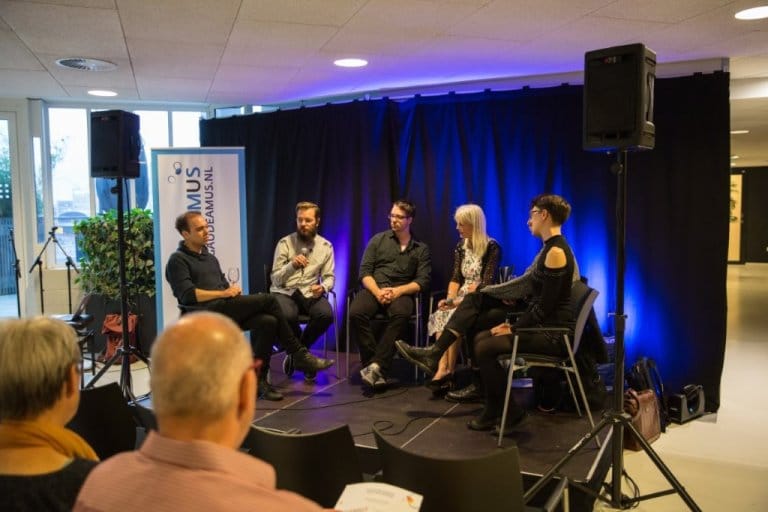Seventy-five years ago, Walter Maas opened the doors of his Villa Gaudeamus in Bilthoven to living composers. A thank-you to our country because, as a German Jew, he had managed to survive the war in hiding. in 2020, the Gaudeamus Music Week has become an international phenomenon, attracting composers from all over the world to our country. The anniversary was supposed to be celebrated grandly, but Corona threw a spanner in the works.
Or not...?!
The opening concert on 9 September was full of surprises, culminating in Hans van Koolwijk's balloon symphony. Following his instructions, musicians sent deflating balloons equipped with whistles into the auditorium of TivoliVredenburg. The result was not only an enchanting sight, but also a true cacophony of sounds, which nevertheless - or precisely because of it - created a festive atmosphere. Until Sunday 13 September, there is still plenty to experience, both online and offline.
At the request of Gaudeamus, I looked back on my own experiences for the programme book of 9 September.
Underserved child
Contemporary music was a neglected child in our country for a long time. Admittedly, international luminaries such as Gustav Mahler, Richard Strauss and Arnold Schönberg conducted their own works with the Concertgebouw Orchestra, but in general, audiences were mainly served classical and romantic music. Even during my musicology studies at the University of Amsterdam (1992-1996), the emphasis was still on the well-known 'masters'.
The cause of new music was - and is - mostly championed by wayward types, afflicted with a large dose of idealism. For instance, only one of my teachers talked about living composers and years earlier was Daniel Ruyneman (1886-1963) a caller in the desert here in the country. Starting out as a sailor and only later becoming a composer, he shocked audiences in 1918 with radical pieces. Among them Hieroglyphs, written for the exceptional instrumentation of three flutes, celesta, harp, piano, cubpells, two mandolins and two guitars. Who said again that ensemble culture began in the 1960s?
Compelling personality
Ruyneman initiated one progressive concert series after another and brought composers such as Bartók, Messiaen and Stravinsky to our country even before the war. He found a kindred spirit in the violinist and conductor Elie Poslavsky (1922-2002), who, from the 1950s onwards, performed countless Dutch and world premieres with his Hague Ensemble for New Music. But most appealing to the imagination is still Walter Maas (1909-1992), who from 1945 organised concerts at Villa Gaudeamus.
I never knew Maas personally, but from witness accounts he emerges as someone with a compelling personality and iron perseverance. If his programming was initially fairly conservative, thanks to supporters like Poslavsky, Ton de Leeuw and Henk Stam, he took a more progressive course. As early as 1951, Else Kraus performed Schoenberg's complete piano repertoire. Electronic music also made its appearance. In 1956, for instance, Stockhausen made a deep impression with a presentation of his Gesang der Jünglinge. Partly due to the composer competition and Maas' generous invitation policy, Gaudeamus gained international fame.
Corvee
Gradually, the organisation became an inescapable factor in the world of new music. When I developed a hunger for new sounds from my background in pop music in the late 1980s, Gaudeamus inevitably crossed my path. Soon, the annual Music Week became a fixture in my concert calendar.
In all honesty, I must confess that this gradually started to feel a bit like chores. Instead of a cross-section of the plurality of contemporary composing, Gaudeamus mainly offered a sea of atonal, mostly serial compositions. The thoughtful but drab pieces did not capture my imagination much. The average concert-goer also felt only moderately addressed and the concerts attracted only a select group of insiders.
English-with-Brabant tongue
Fortunately, there was Henk Heuvelmans (1954). Already when he joined the staff in 1981, he concluded that Gaudeamus was 'not really a flashy event'. When he became director ten years later, he made haste to refresh the organisation. With the establishment of a shadow jury and the introduction of music installations, he tried to make the programme more diverse. The programme booklets also became more colourful and accessible. Yet it took until early 21e century before there was any real new momentum.
This was partly due to the move to the brand new Muziekgebouw aan 't IJ in Amsterdam in 2005. The ultra-modern building with its sweeping views over the IJ proved the ideal setting to present the latest notes from younger generations. Competition participants were accommodated in surrounding hotels and guided by Heuvelmans with fatherly enthusiasm. In charming English-with-Brabant accent, he welcomed composers, musicians and audience: 'Perhaps you will hear the new Mozart this year!' His disarming presentation was at odds with the leaden seriousness that used to cling to Gaudeamus and the hall gradually filled up again.

Utrecht
I myself enjoyed my introductions on Foyerdeck 1, where I interviewed such diverse up-and-coming talents as Huang Ruo, Lu Wang and Reza Namavar. Things gained momentum when Gaudeamus moved to Utrecht in 2011. Together with programmer Martijn Buser (1980), Heuvelmans rapidly developed new formulas, involving practically all concert halls and churches in Utrecht.
Meanwhile, Gaudeamus offers a sampling of music installations, open-air productions, symposia, mini-concerts, courses, composer portraits, presentations and introductions, some of which I had the pleasure of taking part in. Another golden find is that competition participants are paired with an ensemble for which - and with which - they write a new composition in one week.
Vibrant
Anno 2020, Music Week is buzzing like never before. Even corona has barely caught on. How many 'Mozarts' have emerged by now I will leave open, but the rich and varied off- and online offerings create some choice stress. At its 75e the organisation is younger than ever: Gaudeamus is the place to be.
